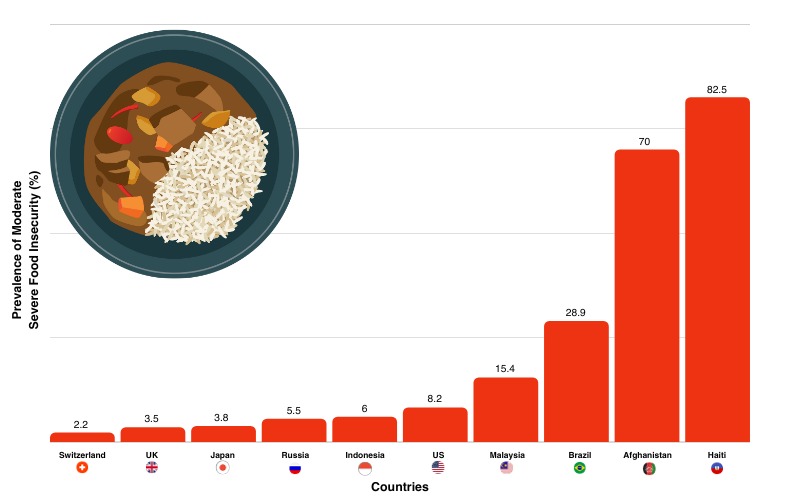Export Duties and the Future of Food Security

This blog post has been authored by Shubhangini Singh, Economics Researcher at Arthashastra Intelligence
The recent imposition of a 40 percent export duty on onions by the finance minister until December 31 has raised concerns about the impact on onion prices in September. This move highlights a broader global issue: the regulation of essential food commodities. In this comprehensive data story, we will delve into the dynamics of export duties on crucial commodities, examining their implications for both domestic and international markets, their role in ensuring global food security, and the revenue structures of developing countries.
Export Duties on Essential Commodities Worldwide
To gain a deeper understanding of the global landscape, let’s delve into the statistics on export duties on essential commodities in specific countries, providing real-world insights:
In India, export duties on rice accounted for approximately 9% of total government revenue in 2022, with the government aiming to balance its revenue needs with food security concerns.
Vietnam, a major coffee exporter, imposed export duties on coffee, contributing to a 14% increase in government revenue from 2021 to 2022. These duties also serve as a means of regulating coffee production and balancing the interests of farmers and exporters.
Russia, a key player in global wheat markets, levied export duties on wheat, generating an estimated 7% of its total tax revenue in 2022. This allowed Russia to control wheat exports and ensure a stable domestic supply.
Reasons for Export Duties
Export duties in developing countries serve multiple purposes, reflecting the unique economic challenges they face:
Market Power and Monopoly Profits: One primary reason is to limit exports when a country possesses significant market power in a commodity. India’s export duties on rice, for instance, aim to stabilize domestic prices and protect the interests of consumers while ensuring that the country maximizes revenue from its rice exports.
Market Imperfections and Overproduction: Market imperfections, such as import quotas or protectionist measures in consuming countries, often drive the imposition of export duties. These measures can create dual price structures, encouraging overproduction in exporting countries. Russia’s export duties on wheat help regulate its export volumes, preventing excess supply in international markets.
Export Duties as Income Taxes:
Export taxes are frequently considered income or direct taxes since they impact the income of domestic producers and exporters. These taxes can have both fiscal and economic effects:
In Vietnam, coffee exporters are subject to export duties, contributing to government revenue while influencing the incomes of coffee producers. These duties have implications for the profitability of coffee farming and the livelihoods of those dependent on the coffee industry.
Stabilisation Schemes and Export Duties:
Commodity stabilization schemes, often used in developing countries, can intersect with export duties. These schemes aim to stabilize international commodity prices, foreign exchange earnings, or domestic consumer prices. Here are a few examples of how this works:
Indonesia has employed export taxes to stabilise the domestic price of palm oil, a crucial commodity for its economy. By adjusting export duties in response to global price fluctuations, Indonesia aims to ensure that palm oil remains affordable for its citizens while supporting its palm oil industry.
Similar stabilization efforts can be observed in other countries like Malaysia, where palm oil is a significant export. By using export duties and quotas in conjunction with commodity price stabilization mechanisms, Malaysia seeks to strike a balance between international market demands and domestic price stability.
Global Food Security and Developing Countries’ Revenue Structures
Understanding the role of export duties in the revenue structures of developing countries is vital in the context of global food security:
These countries often rely on revenue from export duties to fund social and economic development initiatives, including investments in infrastructure, healthcare, and education.
Balancing the need for revenue with the potential impact on global food security is a complex challenge. Governments must consider the interests of various stakeholders, from small-scale farmers to consumers and international trade partners.
The Future of Export Duties and Global Collaboration
As the global landscape evolves, the role of export duties in ensuring global food security will continue to be a topic of debate and study. Some key considerations for the future include:
Adapting to Climate Change: With the increasing impact of climate change on agricultural production, countries may need to reevaluate their export duties and policies to address food security challenges.
Global Collaborations: Collaborative efforts between nations will be critical. Developing countries can work together to address common food security issues, including the impact of export duties, by leveraging international organizations, trade agreements, and innovative agricultural practices.
In conclusion, the imposition of export duties on essential commodities plays a multifaceted role in the global context. While these duties are often employed by developing countries to generate revenue and stabilize domestic markets, their impact extends far beyond national borders. They can influence global food security by regulating supply and prices, which can have far-reaching consequences for consumers, farmers, and international trade partners alike. Striking the right balance between revenue generation and safeguarding food security remains a complex challenge for governments, particularly in the face of evolving factors like climate change.
As we move forward, global collaboration and innovative solutions will be essential in addressing these challenges and ensuring a more sustainable and secure food supply for everyone.
